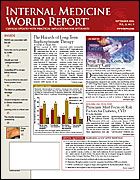Publication
Article
Internal Medicine World Report
Investigational Anticonvulsant Effective for Diabetic Neuropathy
Author(s):
From the American Pain Society
SAN ANTONIO?An investigational anticonvulsant being developed for diabetic neuropathic pain, lacosamide (Schwarz), has been found effective and becomes even more effective with continued use, results of phase 3 clinical trials indicate.
"This is a promising treatment that maintains a long-term effect," Tibor Hidvegi, MD, of Petz Hospital, Gyor, Hungary, reported at the 25th Annual Scientific Meeting of the American Pain Society.
Lacosamide may offer a new alternative to treatment with pregabalin (Lyrica) for those who cannot use that agent.
Investigators recruited 469 patients with distal diabetic neuropathy who had pain scores of ≥4 on the 11-point Likert scale. They were randomized to receive 200, 400, or 600 mg lacosamide daily or placebo for 18 weeks.
P
P
Statistically significant reductions in pain scores were seen after 2 weeks of treatment in the 600-mg lacosamide group compared with the placebo group; by week 18, a 2.5-point reduction in pain score was seen in the same group compared with placebo ( = .065). Patients in the 400-mg group reported a reduction in pain by week 4 of treatment and had a reduction in pain score similar to that of the 600-mg group by week 18 ( = .069).
Dose-related adverse events included blurred vision, nausea, dizziness, tremor, somnolence, and balance problems.
The 22-month results of an ongoing open-label follow-up trial were also reported in the meeting. Included were 214 patients who had been titrated to their optimal lacosamide dose during the double-blind trial. The average lacosamide dose was 400 mg daily, and the median duration of treatment was 358 days.
Pain scores decreased most rapidly during the first 2 months of treatment, with a mean 2-point reduction during the double-blind phase and an additional 1.25-point reduction during the first 4 weeks of open-label treatment. At 22 months, the mean reduction was 4 points on the Likert scale.
In addition, a 3.2-point reduction was seen in patients' perception of how pain interfered with their sleep, a 3.1-point reduction in how pain interfered with their daily activities, and a 3.7-point reduction in overall pain based on assessment with the Visual Analog Scale.
Adverse events with lacosamide were reported by 83% of patients, with 18% of them reporting severe intensity. A total of 24 patients (11%) discontinued treatment because of side effects. Adverse events that were likely to be treatment-related included dizziness (12%), vertigo (9%), headache (8%), and tremor (6%). No prolonged QTc intervals were reported among patients taking lacosamide, and no clinically relevant effects were seen on laboratory parameters during the 22 months of treatment.?
In clinical trials of healthy individuals, and in earlier trials of patients with epilepsy, lacosamide did not interact with oral contraceptive agents and did not influence the rate and extent of absorption of valproic acid, carbamazepine (Tegretol), digoxin (Lanoxin), or metformin (Glucophage).





